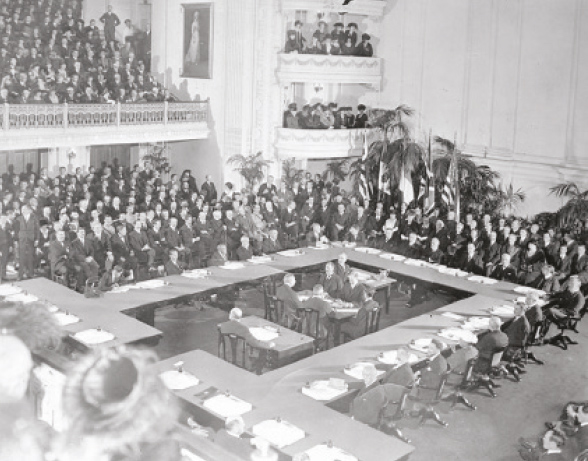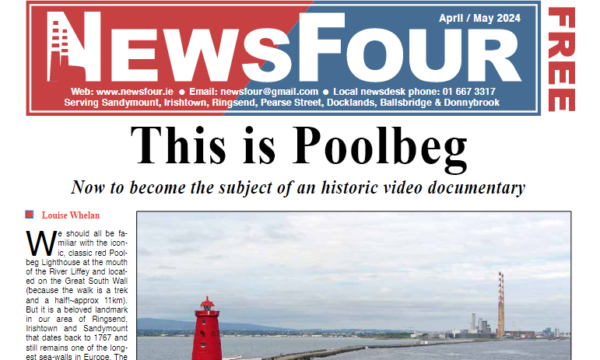
Eoin Meegan
The 2019 Dublin Festival of History is upon us. Throughout the month of October a diverse range of cultural, historical and interactive events recalling how we see and interpret the past will take place right across the city.
The Printworks in Dublin Castle is the venue for a number of discussions around areas of significance in the 20th century. Among them is ‘Six Months that Changed the World: the Paris Peace Conference of 1919’.
Exactly one hundred years ago with the ending of the First World War, the Paris Peace Conference was established. Between January and July 1919 Paris became almost the centre of world government where nations were carved up and new states created.
Margaret MacMillan and Robert Gerwarth tease out the nuances of an event that promised so much but delivered so little, refusing to recognise the new Irish State, as well as being unable to prevent a second war.
Also in 1919, in April, one of the worst atrocities against innocent civilians was committed in what came to be known as the Amritsar massacre. In ‘The Patient Assassin’ Anita Anand will discuss, what must be the darkest hour of the Raj, and how one survivor, Udham Singh, waited twenty years before exacting a strange revenge.
Closer to the present time is ‘Republic of Shame: Stories from Ireland’s Institutions for “Fallen Women”’. Caelainn Hogan, author of the book of the same title, pulls back the curtain on Ireland’s decades of shame, the Magdalene laundries, and Mother and Baby Homes. Caelainn talks to survivors of Tuam, where the discovery of a mass infant grave with almost 800 bodies some years ago justifiably rocked the world.
‘Big Sister, Little Sister, Red Sister: Three Women at the Heart of Twentieth-Century China’ is the intriguing title of a talk by Jung Chang on the fascinating lives of the Soong sisters, Ailing, Qingling and Meiling. These amazing women from Shanghai exerted influence before, during, and after the Revolution in one of the most phallocentric states in the world. Don’t miss their story.
If cinema is your thing you won’t want to miss ‘Does Historical Accuracy in Film Really Matter?’ Cecile Gordon, Hannah Greig and Tom Holland discuss the ethical issue of whether artistic licence should always take precedence over portrayal of the facts in big screen adaptation of historical events, such as Mary Queen of Scots.
In the Central Library, ILAC Centre, Mary Muldowney looks at employment opportunities which the Second World War created for women, in ‘Wartime, Women and Work’, examining the impact women had on the economy, and the social position they played in Ireland and elsewhere at the time.
Meanwhile, in Kevin Street, Clodagh Finn takes a look at women written out of the history books, in ‘On the Trail of Forgotten Women in Irish History’.
Do you remember the hare on the thrupeny piece, the deer on the shilling, or the sow on the old half-penny? If so, this is your chance to once more touch and hear the story of those old coins issued by the Free State in 1928 which lasted until the Euro came into being in 2002, with Maeve Casserly at Ringsend library.
The festival is not only about talks. Running throughout the festival is an exhibition in Dr. Steevens’ Hospital called ‘Surgery at the Edward Worth Library’, where a fascinating display of rare medical books preserved since the 1730s will be on show.
The exhibition ‘Goodbye Dublin: The War of Independence in the City’, a mixture of archival sources and film footage detailing the impact on the everyday lives of Dubliners during the War of Independence runs until the end of October in Dublin City Library and Archive (Pearse Street library).
A number of walking tours are lined up, including ‘Ballads, Beats and Beatles: A Musical History of Dublin’ which covers everything from Handel’s Messiah to Séamus Ennis to rap. There’s also a walking tour of Herbert Park, one of Dublin’s nicest parks, with historian Maeve Casserly.
Seminars are another feature. On 12th October from 9 to 1.00pm ‘The Viking Age: Dynasties, Digs and Discoveries’ takes place at Wood Quay. Such diverse topics as Viking period female graves, brooches of Irish origin, and kings of Dublin in the 9th and 10th centuries come under scrutiny.
Elsewhere on the same topic, Tom Birkett looks at the retelling of myths and legends of medieval Scandinavia, where he will consider ‘points of connection, and fracture, that a popular retelling rests upon’, and asks what is it exactly that makes the Vikings and Norse gods so fascinating to us today? Check out ‘Stories for our Times? Retelling the Norse Myths’ in the Royal Irish Academy.
If fashion is your thing, the City Assembly House in South William Street is the venue for ‘Fabric and Fashion: From Silk Weaving to Singer’. This intriguing half-day seminar casts an inquisitive eye on such diverse topics as weaving in the Liberties, the Huguenots’ influence on the weaving trade, how women’s fashion became more dour due to clothes rationing throughout the war years, and the highs and lows of the textile and fashion industry down the centuries.
Marking the 30th anniversary of the fall of the Berlin Wall, the Goethe Institute is showing three films as part of their series on the Berlin Wall in German Cinema: Wolfgang Becker’s 2003 classic, ‘Good Bye, Lenin!’, Jürgen Böttcher’s documentary ‘The Wall/Die Mauer’, and ‘November Days – Voices and Choices’, described as a kaleidoscope of entertainment images and news footage of the time, get a viewing.
The festival is an annual event by Dublin City Council. All events are free, but some require advanced booking due to the demands of space, while others operate on a first come basis.
To see a full list of events and discover what needs to be pre-booked download the festival programme at festivalofhistory@dublincity.ie Enjoy the festival that celebrates our city.



